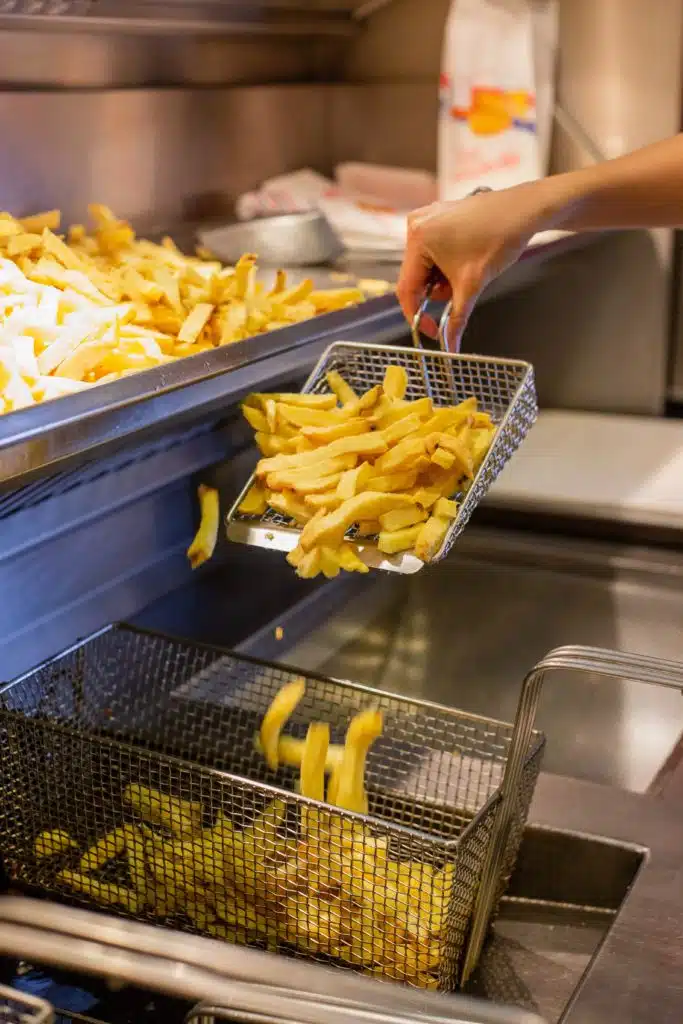Recycling Used Cooking Oil: Improve Sustainability and Profitability In Your Restaurant
Recycling used cooking oil is more than just a sustainable practice—it’s a smart business move. By transforming waste oil into valuable resources like biodiesel, restaurants and other businesses can reduce their environmental impact while boosting their bottom line. This eco-friendly solution helps cut waste disposal costs, generates additional revenue, and appeals to the growing number of eco-conscious customers. Whether you’re in London, Sheffield, or Birmingham, partnering with a trusted recycling company like Bio UK Fuels makes the process simple and rewarding. Discover how recycling used cooking oil can benefit your business and the planet.
🌍 Lifecycle of Recycled Cooking Oil
📦 Step 1: Collection
Restaurants store used oil in secure, leak-proof containers provided by Bio UK Fuels.
🚛 Step 2: Transportation
Our fleet collects the oil on a flexible schedule and ensures safe transport to recycling facilities.
⚙️ Step 3: Processing
The oil is filtered, cleaned, and converted into renewable biodiesel, reducing greenhouse emissions.
♻️ Step 4: Contribution
Biodiesel powers vehicles and machinery, supporting a circular economy and a cleaner planet.
🌟 Quick Facts
- ✅ 1 litre of waste oil can produce enough biodiesel to power a vehicle for 10 miles.
- ✅ Recycling used oil reduces landfill waste by 30% annually.
- ✅ Biodiesel emits up to 80% fewer greenhouse gases than petroleum diesel.
Turn Waste into Opportunity: Recycling Used Cooking Oil
Used cooking oil is often seen as waste, but it holds untapped value. Recycling this oil protects the environment and transforms it into useful products like biodiesel and animal feed. For restaurant kitchens, this practice offers both environmental and economic rewards.
Recycling used cooking oil starts with proper collection. Professional service providers like Bio UK Fuels collect the oil and ensure it is processed safely. This process converts waste into resources that support renewable energy and other industries. For businesses, the benefits go beyond sustainability. Recycling can reduce disposal costs, generate rebates, and appeal to eco-conscious customers, boosting loyalty and revenue.


What Are the Environmental Benefits of Recycling Used Cooking Oil?
Recycling used cooking oil prevents environmental damage caused by improper disposal. Waste oil can clog pipes, overwhelm grease traps, and harm plumbing systems in restaurants. Proper recycling ensures this oil is repurposed into sustainable resources like biodiesel, reducing waste and promoting eco-friendly practices.
Recycling also protects water systems. Disposed oil often enters waterways, polluting surface and groundwater. This pollution harms wildlife, disrupts ecosystems, and affects overall environmental health. By recycling, businesses help prevent these issues while contributing to a greener, more sustainable future.
What Are the Economic Benefits of Recycling Used Cooking Oil?
Recycling used cooking oil provides businesses with significant economic advantages. Responsible disposal reduces costs and opens opportunities to earn money through recycling programmes.
By recycling, businesses contribute to sustainability while improving their bottom line. For instance, a typical restaurant can save up to £1,200 annually by reducing disposal fees and earning income through recycling initiatives. Tools like our used cooking oil price calculator can help restaurants estimate potential rebates and financial savings.
Operational expenses also decrease when using biodiesel, as it is often cheaper than petroleum-based alternatives. Restaurants switching to recycled biodiesel report a 20% reduction in fuel costs. Additionally, over 50% of businesses in recycling programmes have noted higher profit margins due to lower waste disposal fees. Adopting sustainable practices like used cooking oil recycling benefits the environment, supports the community, and improves a restaurant’s financial health.
How Is Used Cooking Oil Recycled?
Recycling used cooking oil involves three key steps: collection, filtering and cleaning, and conversion into biodiesel. Each stage transforms waste oil into valuable, renewable resources while supporting sustainability.
Step 1: Collection
The first step in recycling used cooking oil is proper collection. Restaurants use designated containers to store waste oil separately from other materials, ensuring it is ready for recycling and free from contamination.
Best Practices for Effective Collection:
- Schedule Regular Pickups: Prevent overflow and maintain cleanliness in recycling areas.
- Train Staff: Ensure employees know how to use recycling containers correctly and only deposit used oil.
- Use Clear Signage: Place signs around collection areas to prevent confusion and contamination.
- Partner with Professionals: Work with recycling companies that provide high-quality, industry-standard containers.
By following these practices, restaurants maintain cleaner operations and improve the quality of oil for recycling, benefiting both the business and the environment.
Step 2: Filtering and Cleaning
Once collected, the oil undergoes filtration and cleaning to remove impurities. This step ensures that the oil meets quality standards before being converted into biodiesel. Contaminants like food particles and debris can reduce the efficiency of the recycling process, making this step essential.
Stages of Cleaning:
- Coarse Filtration: Removes larger particles and debris.
- Centrifugation: Uses high-speed spinning to separate impurities based on density.
- Carbon Filtering: Employs activated carbon to absorb smaller contaminants, ensuring a purer final product.
Maintaining cleanliness during these processes ensures the biodiesel meets safety and environmental regulations. Clean oil contributes to producing high-quality renewable fuel while protecting ecosystems.
Step 3: Conversion to Biodiesel
In the final step, the cleaned oil is converted into biodiesel, a renewable and eco-friendly fuel. This process, known as transesterification, combines the triglycerides in the oil with methanol and a catalyst to produce fatty acid methyl esters (biodiesel) and glycerine as a byproduct.
Benefits of Biodiesel:
- Renewable Energy Source: Made from waste oil, it reduces reliance on fossil fuels.
- Lower Carbon Emissions: Helps cut greenhouse gas emissions, promoting cleaner air.
- Biodegradable: Causes minimal environmental damage in case of spills.
- Engine-Compatible: Can often be used in existing diesel engines without modifications.
By converting waste oil into biodiesel, businesses and recyclers reduce pollution, create a sustainable fuel alternative, and support global environmental efforts.


How Can Recycling Used Cooking Oil Benefit Restaurants?
Recycling used cooking oil provides restaurants with financial, environmental, and branding advantages. By participating in recycling programmes, operators reduce costs, boost profits, and appeal to eco-conscious customers while supporting the community and environment.
Cost Savings
Recycling used cooking oil helps restaurants cut waste disposal costs and turn a potential expense into revenue. Instead of frequent oil disposal, recycling transforms waste into a valuable resource, offering both savings and income.
Key Financial Benefits:
- Lower Disposal Fees: Recycling reduces the volume of waste, cutting fees charged by disposal companies.
- Additional Revenue: Selling recycled oil to companies like Bio UK Fuels Ltd generates income, with some businesses earning up to £200 per month.
- Profit Boost: Implementing recycling programmes lowers operational costs and improves financial efficiency.
For example, a small diner might save hundreds annually while contributing recycled oil to biofuel and animal feed production, supporting sustainability and profit.
Environmental Responsibility
Recycling used cooking oil demonstrates a restaurant’s commitment to sustainability. This practice reduces waste, prevents pollution, and conserves resources, enhancing the restaurant’s reputation as an eco-friendly business.
Environmental Benefits:
- Reduces landfill waste and pollution.
- Supports renewable energy production like biodiesel.
- Contributes to the global sustainability movement.
Customers increasingly value eco-friendly practices, often preferring businesses that share their environmental ideals. Recycling builds loyalty, strengthens the restaurant’s image, and fosters a connection with the local community.
Marketing and Branding Opportunities
Restaurants that recycle used cooking oil can leverage this practice to enhance their marketing and branding strategies. Sustainability attracts customers, especially in competitive markets where eco-conscious consumers seek responsible businesses.
Strategies for Showcasing Sustainability:
- Social Media Promotion: Share recycling efforts and achievements to engage an audience focused on environmental impact.
- Customer Loyalty Programmes: Reward patrons who support sustainable practices, such as using eco-friendly transport to visit.
- Eco-Centric Branding: Highlight recycling initiatives in advertising campaigns to position the restaurant as a sustainability leader.
By recycling, restaurants not only protect the environment but also create opportunities to stand out, attract loyal customers, and grow their brand in meaningful ways. If You think your business could benefit from a marketing partnership with Bio UK Fuels, please reach out to our marketing team to see how we can collaborate to show our commitment to sustainability.


How Can Businesses Recycle Their Used Cooking Oil?
Recycling used cooking oil is a simple yet impactful process. Businesses can recycle effectively by partnering with a reliable recycling company like Bio UK Fuels, Contact us today to start earning money from your waste.
er disposal can harm the environment and lead to legal issues. Many communities offer recycling programmes for used cooking oil, providing a sustainable solution.
Enhancing Restaurant Sustainability and Profit FAQs
What is the importance of recycling used cooking oil for restaurant sustainability?
Recycling used cooking oil helps restaurants in cities like London, Sheffield, and Manchester reduce their carbon footprint, support sustainability, and contribute to a healthier environment. This process prevents clogged pipes and sewer backups, lowering maintenance and repair costs. Learn more about the benefits of recycling on our About Us page.
How does recycling used cooking oil benefit a restaurant’s profit?
Recycling used cooking oil generates extra income for restaurants while reducing waste disposal costs. By partnering with a recycling company like Bio UK Fuels, businesses can sell their oil for conversion into biodiesel or animal feed. For a detailed calculation of potential earnings, use our used cooking oil price calculator.
What is the process of recycling used cooking oil?
The recycling process is straightforward yet highly effective. First, used cooking oil is collected from restaurants in secure containers, ensuring it is safely transported for processing. Next, the oil undergoes filtration to remove impurities, maintaining the quality required for renewable fuel production. Finally, the cleaned oil is converted into biodiesel, a sustainable energy source that reduces reliance on fossil fuels
How much can a restaurant earn by recycling used cooking oil?
What type of businesses can benefit from recycling used cooking oil?
Any business that uses cooking oil can benefit from recycling. This includes restaurants, catering companies, schools, and universities. Learn more about recycling for schools and universities or food manufacturers on our dedicated pages. Businesses in cities like Leeds, Stockport, and Southampton can also access collection services from Bio UK Fuels.
About Martin Simpkins
Martin Simpkins is a dedicated business professional with hands-on experience in operations, fuel supply management, and client service within the UK energy sector. Through his role at Bio UK Fuels, he has been involved in daily business operations, customer coordination, and ensuring smooth delivery of fuel services to commercial clients.
Martin’s work reflects strong organisational skills, a practical approach to problem-solving, and a focus on maintaining reliable business relationships. Colleagues and partners know him for his steady communication style and his commitment to keeping projects running efficiently.


